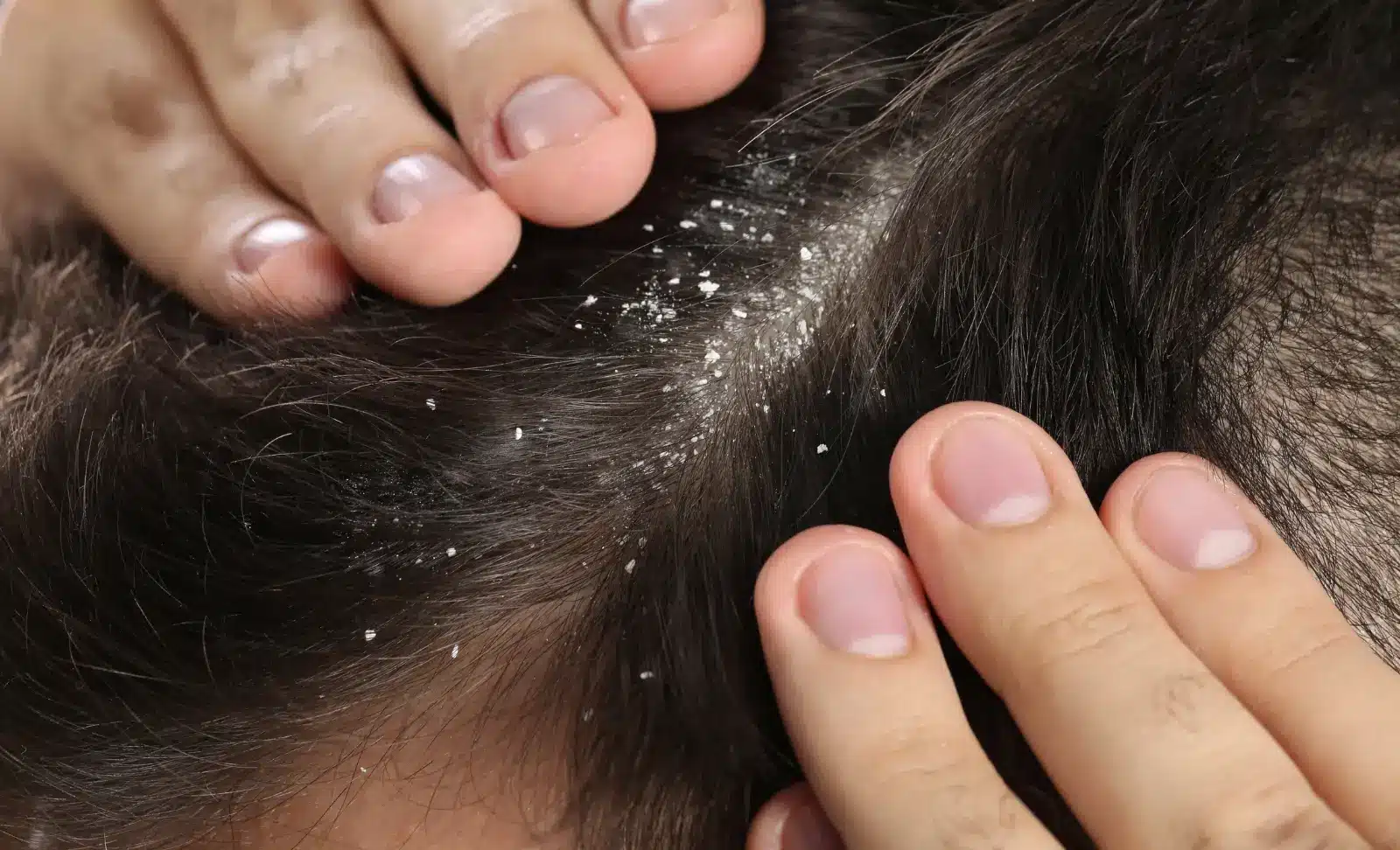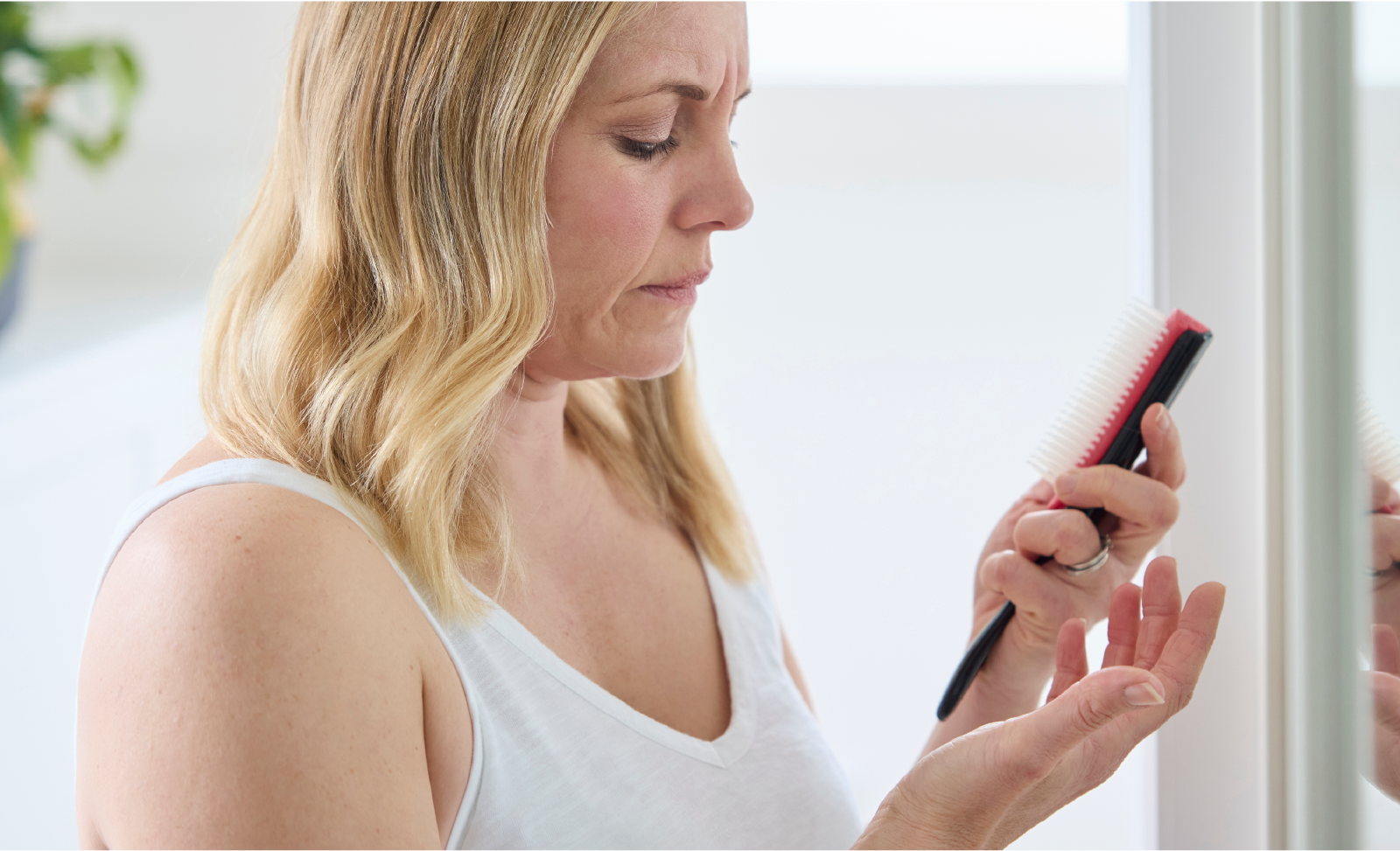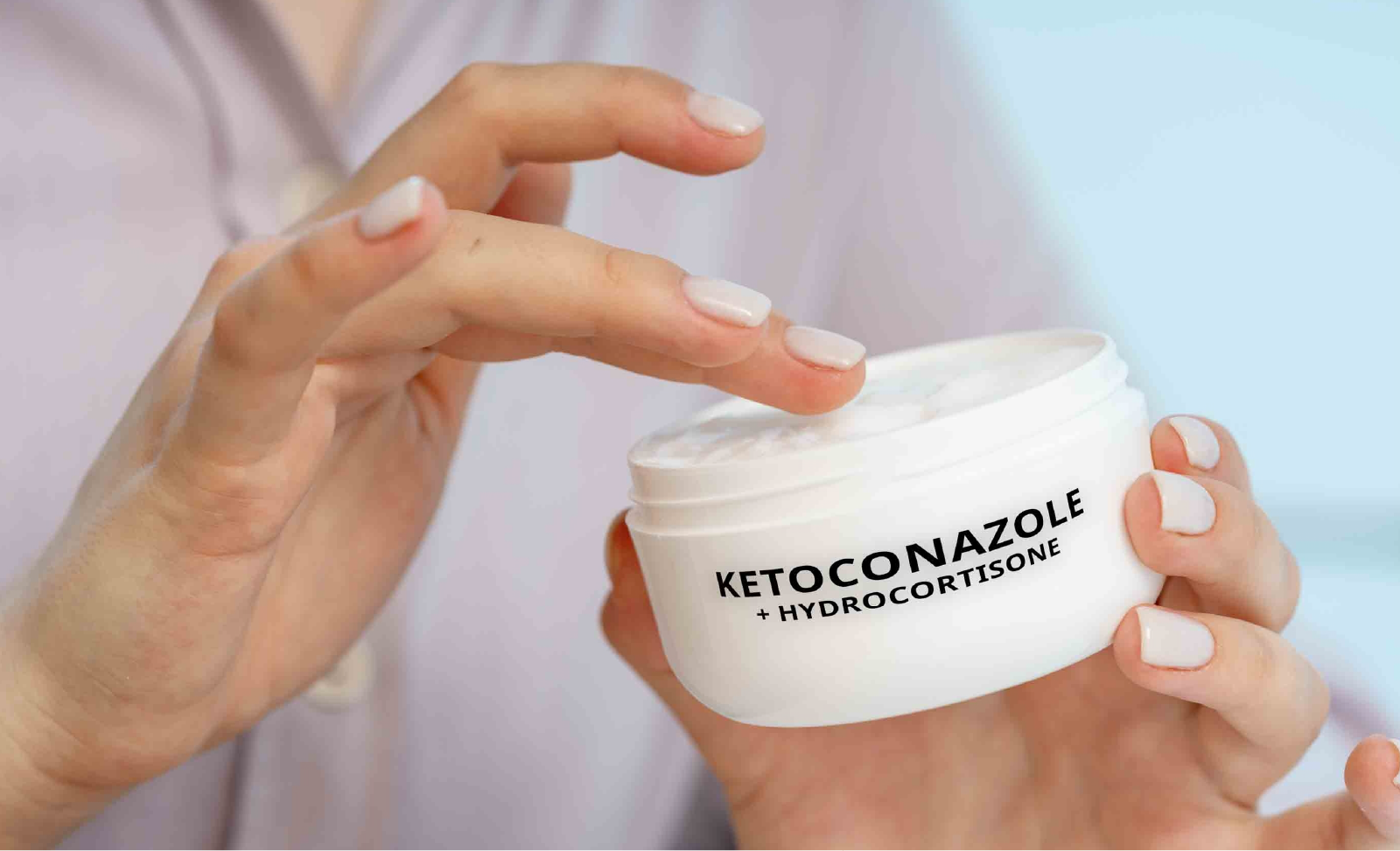Dandruff is a common skin condition that causes flakes on the scalp. While it doesn’t typically cause hair loss, it does make the scalp feel very itchy, and if a person excessively scratches their scalp to relieve the itchiness, that could damage the hair follicles and cause hair loss. Managing dandruff with appropriate treatments can reverse this.
- What is Dandruff? Dandruff is a very common skin condition that causes flakes and itchiness on the scalp.
- Can Dandruff Cause Hair Loss? Only indirectly. Dandruff does not directly cause hair loss, but excessive dandruff may lead to a lot of scratching of the scalp, which can damage the hair follicles and slow or even stop growth.
- What Causes Dandruff? Common underlying causes include seborrheic dermatitis, fungal infections, and psoriasis. Dandruff can also be triggered by a dry scalp, stress, and oil imbalance.
- How Do You Treat and Prevent Dandruff? You can treat dandruff with medication shampoos that contain ketoconazole, salicylic acid, and zinc pyrithione. Home remedies include aloe vera and tea tree oil.
- Is Hair Loss from Dandruff Temporary? Usually, yes – the hair loss indirectly caused by dandruff is typically temporary. If you treat the dandruff and stop the scratching, hair should grow back through.
The hair on your scalp doesn’t always stay in place forever. Many things may cause the hair to fall, from the common alopecia androgenetic to something like stress. One thing you might be concerned about is dandruff. The question is, does dandruff cause hair loss? If so, is there something you can do about it? In this article, find out everything about the link between dandruff and hair loss to give you the best chance of retaining your locks.
What is Dandruff?
Dandruff is a very common skin condition that typically affects the scalp and causes it to flake. It can affect anyone, with dandruff affecting around half of the population. [1] While it isn’t harmful, it can cause some insecurities thanks to the visibility of the dandruff (which shows up more on darker hair). Plus, some of the causes of dandruff can lead to more unpleasant symptoms that you’d want to get under control.
Can Dandruff Cause Hair Loss?
Now, on to the all-important question: can dandruff cause hair loss? Indirectly, yes. While the dandruff itself does not cause the hair to fall out, the way you react to the dandruff might. Dandruff often comes with a lot of itchiness, causing a person to scratch their scalp. The more intense the dandruff is, the more itchiness the person will feel, meaning they are more likely to scratch harder and create injuries on the scalp, leading to hair loss.
Some of the causes of dandruff can lead to hair loss, too, which we’ll go into next.
What Causes Dandruff?
Naturally, you want to know what causes dandruff so you have the best possible chance of avoiding it. Dandruff occurs when the scalp is dry and itchy, which causes those white flakes and can occur due to:
Scalp Psoriasis
Scalp psoriasis is as it sounds – psoriasis that targets the scalp. Psoriasis is categorised by its symptoms, which include having dry, itchy, scaly patches on the skin. The most common places to get psoriasis include the elbows, knees, trunk, and scalp [2] – basically, anywhere more likely to endure a build-up of sweat or oil (although minimising this won’t always tackle the psoriasis). Psoriasis can lead to hair loss, particularly if the sufferer is prone to scratching and picking at it.
Seborrheic Dermatitis
Another common condition that can affect the scalp and lead to dandruff is seborrheic dermatitis. It’s common and is often triggered by oily areas of the body, which is why it’s so common on the scalp. Certain triggers can cause seborrheic dermatitis, such as using a new detergent or hormonal changes. There are also conditions that make seborrheic dermatitis more likely to occur, including Parkinson’s Disease, rosacea, psoriasis, and HIV.
Fungal Infections
Yes – fungal infections can affect the scalp. One type of fungal infection of the scalp is tinea capitis (ringworm), which creates a lot of dryness, itchiness, and inflammation. The more severe the fungal infection is, the more chance the hair will fall out.
Be aware that dandruff isn’t always caused by these conditions – sometimes, it can occur because of a particularly dry scalp.
Does Poor Hygiene Cause Dandruff?
No – contrary to some people’s belief, it’s not poor hygiene that tends to lead to dandruff. People who clean their hair daily may still experience it, and washing your hair normally won’t get rid of it. However, poor hygiene – particularly, not washing your hair often – may lead to the dandruff looking more obvious, as you won’t be washing the flakes out. You’ll notice that the dandruff also tends to look worse in dry, cold weather.
How to Treat Dandruff at Home
The good news about dandruff is that you can treat it at home, as there are plenty of over-the-counter shampoos specifically designed to ease symptoms and leave you with a healthy scalp. Here are some of the best home treatments for dandruff:
Salicylic Acid
Salicylic acid works well for treating dandruff as it prevents fungal infections – so if a fungal infection is causing your dandruff, it should work well. You can find certain shampoos containing salicylic acid, making this treatment super simple.
Ketoconazole
Ketoconazole is an anti-fungal remedy that you can find in anti-fungal creams and shampoos. It helps with both the prevention and treatment of dandruff.
Zinc Pyrithione
Another common remedy for dandruff is zinc pyrithione, which has many anti-fungal and antibacterial properties that target many of the causes of dandruff, such as seborrheic dermatitis.
Other Home Remedies
There are some treatments that you may already have lying around your home that could help treat dandruff, including:
- Aloe Vera
- Tea Tree Oil
- Apple Cider Vinegar
- Coconut Oil
- Baking Soda
If your dandruff is mild, consider giving one of these a try. However, don’t rely on these home remedies if your dandruff is severe and you’re experiencing hair loss because of it – a more reliant treatment option is probably better here.
What if a Home Treatment Doesn’t Work?
If an over-the-counter medicated shampoo doesn’t do the trick, it’s time to schedule a visit to your GP. Once there, your doctor will examine your scalp health and get to the root cause of the issue, and will then be able to prescribe a treatment specific to you. If you have hair loss caused by dandruff, they may also be able to help you find the right hair loss treatment to reverse the damage.
Preventing Dandruff
It’s not always easy to prevent dandruff, but there are some habits you can get into to minimise your risk as much as possible, including:
- Managing Your Stress
- Maintaining a Healthy Diet
- Washing Your Hair (especially after a hot day or a workout)
- Getting Some Sunshine
- Not Using Too Many Products that Build Up on the Scalp
Is Dandruff Hair Loss Reversible?
Yes! The good news is that dandruff hair loss tends to be temporary hair loss, so your hair should grow back after treatment. If it doesn’t, it’s best to speak to a dermatologist.
Treating Dandruff Hair Loss
Now, you know that the answer to ‘Does dandruff lead to hair loss?’ is that – yes, in some cases, it can, and it’s primarily due to the other causes of dandruff. So, what about treating it? The best thing to do here is to treat the dandruff first to prevent any further hair fallout. From there, you can either wait for the hair to grow back (as we mentioned, it’s usually a temporary type of hair loss) or try to speed things up a little with a hair loss treatment. There are plenty of good home remedies that can help with hair growth, including rosemary oil and pumpkin seed oil.
What if Dandruff Isn’t Causing Your Hair Loss?
So, what if the cause of your hair loss is not dandruff? It’s entirely possible that you have dandruff and hair loss and the two are not linked. In fact, likely, your hair loss isn’t caused by dandruff, as there are more likely culprits, such as androgenetic alopecia. Androgenetic alopecia (male/female pattern baldness) is a type of genetic hair loss that tends to occur with age, although affects some people in their younger years. In men, it tends to affect their temples and crowns, causing thinning and baldness. In women, androgenetic alopecia usually causes hair thinning all over and a wider scalp. In this case, you’ll need to look into other treatments, such as hair loss medications like minoxidil and finasteride or a hair transplant.
Do You Want to Start Your Hair Restoration Journey?
Are you tired of hair loss? Even though hair loss isn’t a physical problem, it can lead to some emotional issues, as many people see their hair as part of their identity. Such a change to one’s appearance isn’t always easy to handle. The good news is that the Harley Street Hair Clinic team are experts in hair restoration and can help you kickstart your journey towards a full head of hair once more.
We specialise in hair transplants to treat hair loss (often caused by androgenetic alopecia). If dandruff is causing hair loss, it’s best to get the dandruff under control before seeking our treatment, and one of our helpful experts can help you. Check out our patients gallery to see the incredible results our top surgeons have been able to create.
Can Dandruff Cause Hair Loss: In Summary
Hopefully, we have cleared up any questions relating to the question: can dandruff cause hair loss? The answer is that, yes, indirectly, it can, with some of the causes of dandruff being more likely to cause the hair to fall out than the white flakes themselves. You might also experience hair falling out due to itching the scalp too much, which damages the hair follicles. Once you treat the dandruff, whether that’s with a medicated dandruff shampoo or with a trip to the doctor, your hair should grow back.
Have you got dandruff under control, but are still experiencing hair loss? Contact our team today to let us help you. Our hair track app is handy, as it puts you in touch with our expert surgeons, allowing you to book a no-obligation consultation.
Sources:
- https://www.ncbi.nlm.nih.gov/pmc/articles/PMC2887514/
- https://www.mayoclinic.org/diseases-conditions/psoriasis/symptoms-causes/syc-20355840




